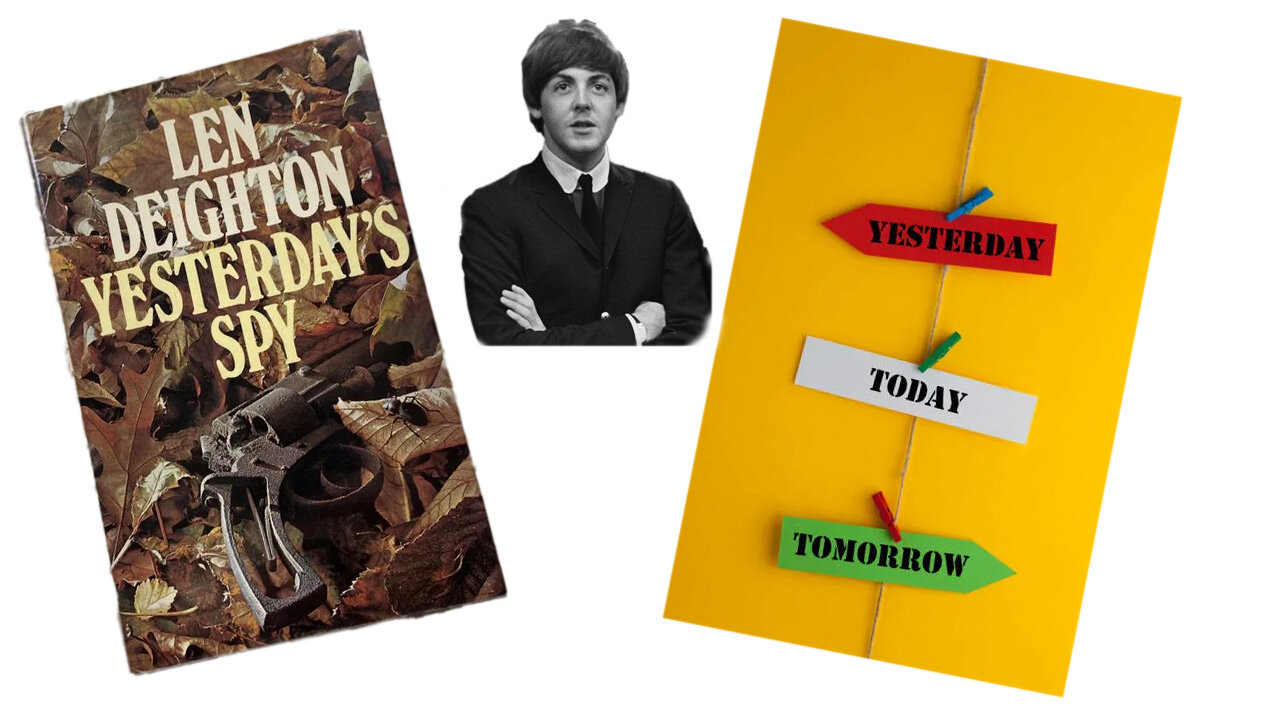Premium Only Content

'Yesterday's Spy' (1975) by Len Deighton
In 'Yesterday’s Spy' (1975), Len Deighton delivers a lean, melancholic novel of Cold War espionage that marks a tonal shift from the sardonic wit of 'The Ipcress File' or the grand paranoia of 'Billion-Dollar Brain'. Where earlier novels embraced satire, bureaucracy, and the sprawling ambiguities of spy networks, 'Yesterday’s Spy' is more intimate and elegiac—a meditation on aging, loyalty, and the fading world of Britain’s imperial intelligence services.
Told with Deighton’s trademark concision and subtle irony, the novel is less about the machinations of geopolitics and more about the psychological toll of living a life in the shadows. Set against a backdrop of revolution and counter-revolution, 'Yesterday’s Spy' is a story of personal reckoning disguised as a spy thriller.
Plot Summary: The novel follows Steve Champion, a former wartime agent and intelligence man now living in semi-retirement, who is drawn back into the murky world of espionage when he receives a troubling report: his son, Harry Champion, also in the intelligence service, has gone missing in the Middle East—specifically Iran, where revolutionary tension is boiling.
Steve, out of loyalty to his son and a deeply embedded sense of duty, begins to trace his whereabouts. This quest takes him through a world he no longer fully understands, encountering familiar faces from the intelligence world who have aged, grown weary, or become enigmas even to themselves. As Champion investigates, it becomes increasingly unclear who is helping and who is manipulating him. The trail is littered with ghosts—both personal and political.
But 'Yesterday’s Spy' is not a tale of fast-paced action or high-tech subterfuge. Instead, it is a quiet exploration of the emotional wreckage left behind by the Cold War: fractured families, broken allegiances, and careers built on lies.
Themes: Deighton’s central theme here is the passage of time, and with it, the obsolescence of people and ideas. Steve Champion is a man out of step with modern intelligence—a Cold War relic whose instincts remain sharp, but whose methods and assumptions belong to another era. The novel explores the costs of living a life defined by secrecy: emotional isolation, the inability to trust, and the erosion of personal relationships.
There is also the theme of generational conflict. The novel hinges on the relationship between Steve and his son Harry, which is strained, distant, and riddled with misunderstandings. In a sense, the espionage plot is secondary to the more human question: can a father and son, both shaped by the machinery of intelligence, ever truly know or trust each other?
Furthermore, the novel interrogates British decline—an unspoken backdrop in much of Deighton’s work. The Empire is gone, the Suez Crisis is past, and the British intelligence community is caught between irrelevance and inertia. 'Yesterday’s Spy' takes place in a twilight zone of influence: Britain still acts, still schemes, but its power is a shadow of its former self.
Narrative Style and Tone: Deighton’s style here is restrained and mournful, more akin to le Carré than to his own earlier work. The clipped dialogue, detailed observations, and spare descriptions serve to evoke a world in which nothing is quite said directly—and in which silence often means more than speech.
Unlike Deighton’s unnamed protagonist in the Ipcress novels, Steve Champion is older, wearier, and less inclined to ironic detachment. His perspective is reflective, even sorrowful, as he navigates a political terrain that has moved beyond him. But Deighton never lets the narrative become indulgent. The story remains taut, with sudden revelations and moments of sharp tension that remind the reader of the deadly stakes.
Reception and Legacy: At the time of its release, 'Yesterday’s Spy' received mixed reviews. Some critics praised its emotional depth and mature tone, while others found its pace too slow and its plot too elusive. In retrospect, however, it can be appreciated as one of Deighton’s most understated and human novels—a book that trades fireworks for melancholy realism.
It never received a film adaptation and is often overlooked in favor of Deighton’s more popular works. Yet in many ways, 'Yesterday’s Spy' marks an important evolution in his storytelling—from stylish satire to character-driven narrative.
Conclusion: 'Yesterday’s Spy' is not a conventional spy thriller. It is a novel about memory, disillusionment, and the cost of loyalty in a profession built on betrayal. With its subdued tone, morally ambiguous characters, and haunting sense of loss, it may not appeal to readers looking for fast-paced action. But for those willing to sit with its quiet revelations, it offers a rewarding and elegiac journey into the emotional ruins of the Cold War.
Len Deighton, ever the master of ambiguity, shows here that the most dangerous spy stories are often the ones closest to home.
-
 52:11
52:11
Sarah Westall
7 hours agoBread and Circus Keeps you Financially Ignorant – Its Better for the Elites w/ Chris Russo
47.8K3 -
 LIVE
LIVE
I_Came_With_Fire_Podcast
13 hours agoFriday Night Live Fire
539 watching -
 1:20:39
1:20:39
Flyover Conservatives
15 hours agoFrom Demonic Deception to Divine Direction: Sid Roth’s Radical Encounter With God | FOC Show
40.9K1 -

Chrissie Mayr
3 hours agoChrissie Mayr Reactions to Charlie Kirk, Liberal Celebrations, and More
35.9K12 -
 1:05:46
1:05:46
AlaskanBallistics
4 hours ago $0.79 earnedRemembering Charlie Kirk
38.2K6 -
 1:23:27
1:23:27
Glenn Greenwald
6 hours agoNetanyahu’s Crude Exploitation of Charlie Kirk’s Death to Get the American Right Back into Line; Plus: Q&A With Glenn on Charlie Kirk's Assassination, Online Civil Discourse, and More | SYSTEM UPDATE #514
202K140 -
 4:10:25
4:10:25
Nerdrotic
10 hours ago $1.04 earnedCulture Is VITAL! Streaming BUST, Warner Bros. Buyout | Friday Night Tights 371 with Vara Dark
213K28 -
 1:02:32
1:02:32
BonginoReport
8 hours agoCharlie Kirk’s Assassin In Custody, Details Emerge - Nightly Scroll w/ Hayley Caronia (Ep.133)
196K214 -
 LIVE
LIVE
LFA TV
1 day agoKILLER CAUGHT LIVE PRESSER! - FRIDAY 9/12/25
560 watching -
 26:08
26:08
The Mel K Show
7 hours agoMel K & Ken Silva | Updates: Trump Attempted Assassination Trial, North Carolina Investigation, & Silver Bump! | 9-12-25
51.3K5